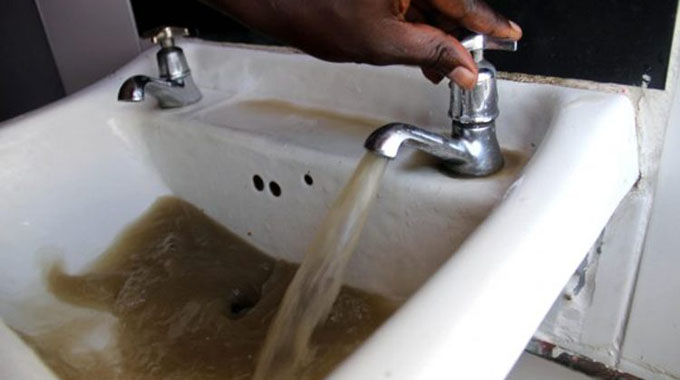Should residents continue paying for water?

Jeffrey Gogo Climate Story
Mike (not his real name) lives with his mother in a 3-bedroomed house in Mabelreign. The mother is often away for days attending to her religious calling. A 22-year old bachelor rents a room on Mike’s premises.
He works in the mines outside Harare and is barely home, usually only for a few days in a calendar month. Without a job, Mike, 21, is home alone for most of the time.
But two things remain constant: the monthly water bill and water unavailability. Harare’s middle-income suburb of Mabelreign is notorious for severe water shortages.
Household taps perennially run dry. Mike said they get municipal water once a week, for a few hours, and often in the dead of the night when everyone is fast asleep. So now they have to sleep with taps open, buckets in-situ, conditioned to trap the precious liquid.
That’s always been a losing battle though. Borehole water from a nearby school, a police camp and some Christian churches have become a lifeline for Mike. Mother and son have lived like this, dragged from pillar to post, for many years.
Meanwhile, the City of Harare continues to bill for water, each month claiming from the family anything above $50 for services not rendered, the irony of it all lost on the authority. Mike charged that refuse is seldom collected, they have to dump it in open spaces or burn the trash in their backyard.
“We decided to stop paying for water altogether,” Mike revealed. “It just didn’t make sense.
“We would rather pay the primary school that supplies us with clean water everyday.” When the City of Harare official next visited with the threat to cut off water for unpaid bills Mike gladly cheered him on. He cut the water off.
“It’s been months since Mike used municipal water or paid for it, something that is fast catching on with many of Harare’s disgruntled residents.
They simply do not see the wisdom of paying for services that are at best erratic, and when they aren’t, the water has visible impurities, produces an odour and falls far below World Health Organisation standards for safe drinking water.
Harare considers residents like Mike who resist paying water bills delinquent and says cutting off water is the only way to get people to pay their bills. The city might have a point.
Undoubtedly, some residents and businesses have taken advantage of the mess to default on bill payments, leading the Harare Municipality to claim it is owed as much as $500 million in unpaid bills in 2016. But that’s where it ends. A few years ago, as the city authorities went into overdrive switching off water taps, the High Court found that most bills were in dispute as ratepayers alleged over-charging. Harare Residents Trust (HRT) director Precious Shumba said then: “The significance of municipal water services has been severely crippled given the fact that the water delivered is discredited in the experience of residents.”
His comments have not lost relevance to this day.
People still claim to be drinking dirty municipal water. This past week, those with key responsibilities in water management and supply like EMA and the City of Harare have been stampeding to declare their innocence while pointing the finger of culpability in the other direction, a blame game forever shone of delivering necessary results.
Regardless, the HRT has consistently urged Harare residents to pay some nominal amount every month for their property tax and fixed services like sewerage, and only pay for rates for services actually provided. Others believe the city should go the Zesa way – installing prepaid water meters, which will arguably help with debt collection while keeping the taps running.
Power utility, Zesa Holdings, has installed thousands of pre-paid electricity meters in households. A certain portion of money is deducted with every purchase of power for those in arrears. This helped Zesa recover some of its debt without disconnecting anyone.
This programme does not exist in water, and even if it did, some doubt it would work. That’s because comparing water and electricity is not objective, according to HRT’s Shumba.
Water has no substitute or alternatives like electricity which can be sufficiently substituted by use of gas, candles, solar, firewood, charcoal, generators and others, he argues.
Water scarcity is predicted to worsen across southern Africa, with a 2012 World Bank report predicting that dam and lakes levels will fall by up to 50 percent by 2080 due to the effects of climate change.
In Harare, a combination of drought, ageing infrastructure, pollution and a ballooning population makes it almost impossible for the city to adapt to a water crisis it has suffered for 20 years. A 2014 survey by the Government and international aid agencies showed the number of Harare households with access to clean drinking water and sanitation had plummeted to just below 40 percent, from 95 percent in 2009 – the fastest decline among Zimbabwe’s 10 provinces.
The greatest fear now is not whether residents pay their bills or Harare cuts off the poor, but when the next outbreak of water-related disease will occur.
Water shortage and poor sanitation are a ground for spread of diseases such as cholera, typhoid, and others. In the past, Harare has reported dozens of cases of typhoid fever, a deadly bacterial infection that causes fever, headaches and constipation or diarrhoea. It didn’t need unpaid water bills to turn off anyone. For Mike, the Mabelreign resident, disconnections of water services will not likely influence the city’s revenue inflows because residents have become used to living without decent and consistent municipal services.
“I think we will only start paying for water when water starts flowing more regularly,” he opined.
God is faithful.









Comments